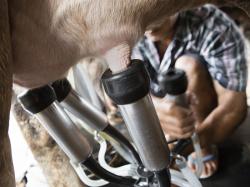Understanding Risks From Consumption Of Nonpasteurized Milk
May 29, 2018 | 1 min to read

Illness related to consumption of nonpasteurized (raw) milk and other dairy products continues to be a public health problem. Although the Food and Drug Administration banned the interstate distribution of nonpasteurized milk in 1987, each state determines laws regulating intrastate sale. State regulations range from complete ban on the intrastate sale of nonpasteurized milk to permitting sales from stores.
Consuming pasteurized milk provides similar nutritional benefit as raw milk but without the risk of acquiring disease. It is possible to acquire foodborne illness from any food, but unpasteurized milk products present one of the highest risks. The risk of illness from consumption of raw milk is greatest for infants and young children, older adults, pregnant women and anyone with a compromised immune state. But even a healthy person can acquire serious illness from ingestion of raw milk.
The number of outbreaks linked to raw milk increased from 30 in 2007 through 2009 to 51 in 2010 through 2012 (Mungai EA, et al. Emerg Infect Dis. 2015;21:119-122).
To read the rest of the story, please go to: AAP News
